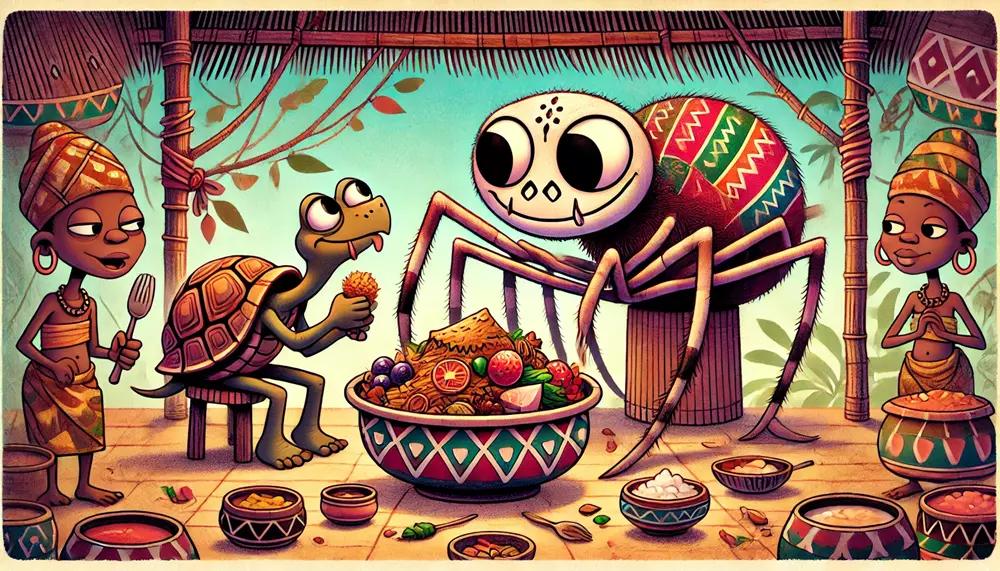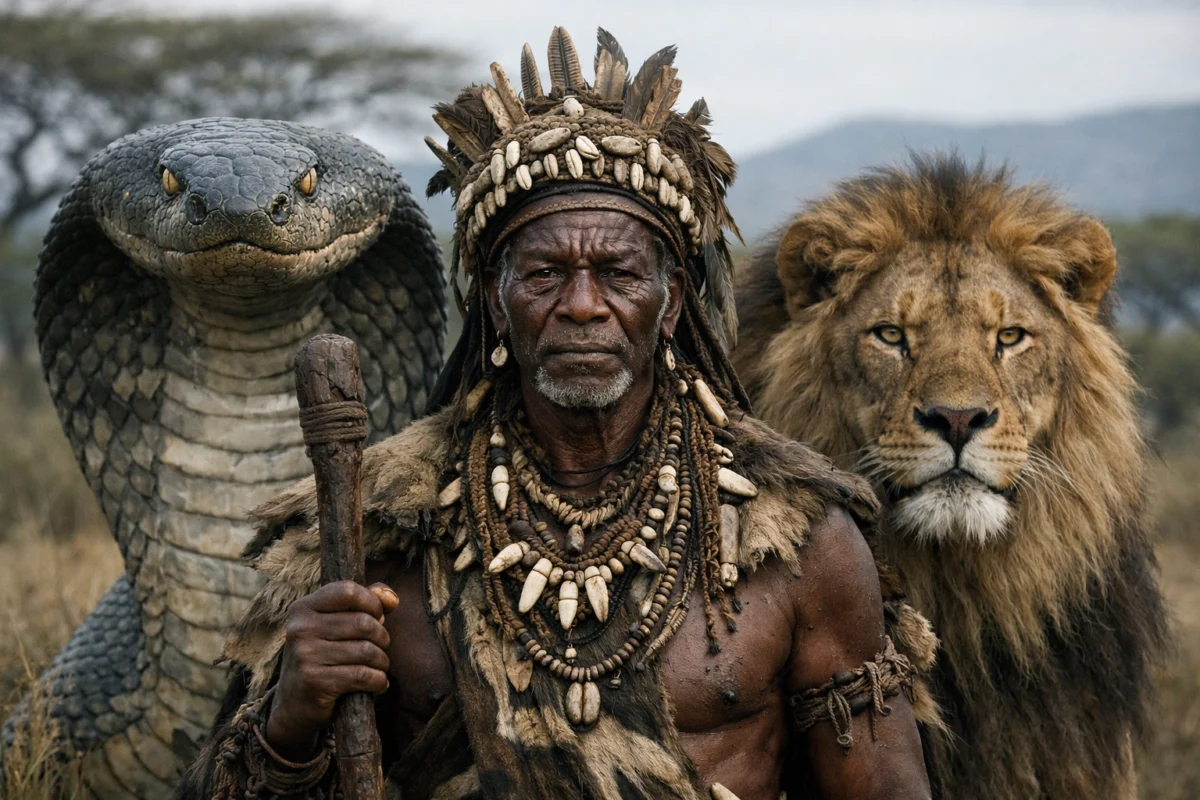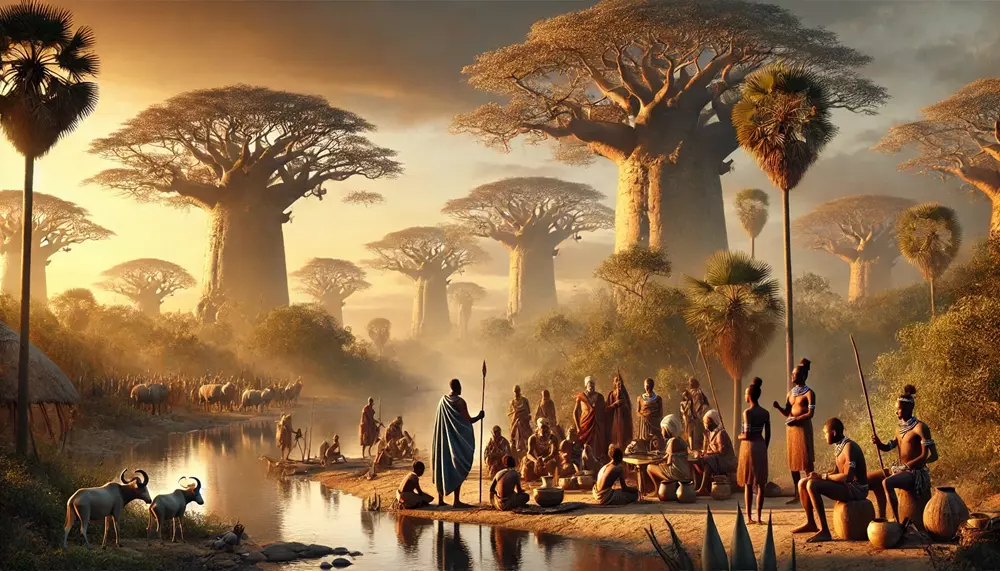Anansi: The Trickster Spider God Who Rules Storytelling
Anansi is a force of nature when it comes to African folklore. This spider-god from Ghana’s Ashanti people has stolen the show as a trickster and master of tales.
Clever, hilarious, and always a few steps ahead, Anansi isn’t about brute strength, he’s all about wit. He’s the underdog’s hero, showing that brains can outsmart brawn.
From Africa to the Americas, Anansi’s legacy has shaped stories, laughs, and life lessons, teaching us the power of a good mind and a well-placed trick.
History/Origin
Anansi’s roots run deep in West African culture. He first crawled into stories among the Ashanti people, where he gained fame for outwitting gods, humans, and animals alike.
The tales of Anansi spread far beyond Ghana, thanks to the African diaspora. Enslaved Africans brought Anansi’s tales to the Caribbean and North America, where he became a symbol of resilience and survival.
His stories morphed and blended with local cultures, showing up in tales of Br’er Rabbit in the American South and even in Haitian and Jamaican folklore.
“In the beginning, there were no stories on Earth. The Sky God, Nyame, owned them all, and Anansi went to claim them.”
When people needed a story of triumph over hardship, Anansi delivered, proving that quick thinking and humor could keep the spirit alive. As one tale says, “Anansi wove his way into the hearts of many, spinning tales that taught survival and joy.”
Name Meaning
The name “Anansi” isn’t just a label; it’s a title. In the Akan language, spoken by the Ashanti, “Anansi” simply means “spider.”
But don’t let the simplicity fool you. In these stories, “Anansi” became shorthand for cleverness and cunning.
Over time, Anansi has become synonymous with more than a spider. His name represents resourcefulness, the ultimate trickster, and the friendliest foe in African folklore.
Background Story
Anansi has a treasure trove of stories, each showing off his cunning in a fresh way. One of the most famous tales tells how he became the god of all stories.
Long ago, only the Sky God, Nyame, owned the world’s stories. Anansi wanted them, so he made a deal: he’d capture Nyame’s fiercest enemies, the python, the leopard, and the hornet, in exchange for the stories.
Using his wits, Anansi captured them all. Impressed, Nyame gave Anansi control over the stories, and from then on, people called him the god of storytelling.
“With his web of cunning, Anansi caught the python and the leopard, proving that wit could capture even the fiercest of beasts.”

In another tale, Anansi tricks a turtle out of dinner by making him wash his hands repeatedly. Just when the turtle sits down to eat, Anansi gobbles up all the food.
Anansi’s stories are a masterclass in trickery, showing that with the right plan, even a small spider can win big.
Cultural Impact
Anansi’s cultural reach goes far beyond folklore. He’s a symbol of defiance, survival, and the spirit of the downtrodden.
His stories comforted the enslaved people who found inspiration in his resourcefulness. Anansi reminded them that even in the face of injustice, cleverness could help them keep a sense of dignity.
The Anansi stories were like survival guides for the mind, teaching resilience and hope.

“Anansi weaves tales as webs, binding wisdom with humor so that those who listen will remember.”
Anansi’s tales also formed the bedrock of many oral traditions, not just in West Africa, but wherever the stories traveled. His influence is seen in storytelling forms across the Caribbean, the U.S., and Latin America.
Anansi, like the web he weaves, ties people together through shared experiences and lessons learned.
Similar Beasts
Anansi stands alongside other cunning tricksters worldwide. Loki from Norse mythology is a shapeshifter and trickster, often pulling pranks on gods and giants alike.
The Greek god Hermes, known for his quick wit, also shares Anansi’s playful but helpful nature. In Native American folklore, the Coyote figure weaves similar tales of trickery and wisdom, often navigating the line between hero and troublemaker.
However, Anansi’s unique spider identity sets him apart. Unlike the others, he operates through storytelling, shaping lives with his tales.
Trickster gods may exist across cultures, but few have the storytelling charm that Anansi brings to every tale.
Religion/Ritual
Anansi isn’t worshipped in a traditional sense, but he’s honored as a cultural hero. His stories aren’t just for laughs, they’re moral lessons, guides for living.
In the Akan traditions, storytelling itself can be seen as a ritual, a way to pass on Anansi’s wisdom. Children learn right from wrong through his tales, and adults see Anansi’s wit as a way to navigate life’s challenges.
Some places even hold storytelling events as a form of homage to Anansi. During festivals, communities gather to share his stories, reminding themselves of his cleverness and the lessons he brings.
His tales are respected as much as they are enjoyed.
Scientific or Rational Explanations
While Anansi’s tales are mystical, some elements root in reality. Spiders, known for weaving intricate webs, naturally symbolize creativity, patience, and cleverness.
Anansi’s character reflects these traits, especially his knack for building intricate plans.
In psychology, the “trickster” archetype, represented by Anansi, explains how humor and cleverness help people face hardship. Trickster figures provide psychological relief, showing that there’s always a way out, even if it’s a bit unconventional.
Anansi embodies this perfectly, making people laugh while teaching them to stay sharp.

Modern Cultural References
Anansi didn’t stop at folklore. He’s made his way into modern pop culture in a big way.
Here’s a rundown:
Neil Gaiman’s “American Gods” – Anansi appears as Mr. Nancy, a character who uses wit and humor to navigate the world of gods and humans alike.

Marvel Comics – Anansi appears as a spider god, bringing his trickery and storytelling to the Marvel Universe.
Anansi Boys by Neil Gaiman – The novel gives Anansi a lead role, showing his legacy through his sons and how his trickster ways impact modern life.
Sesame Street – Anansi has a place in children’s stories, where his tales are adapted for young audiences to learn valuable lessons.
Jamaican Folklore Festivals – Events dedicated to Anansi stories keep his legend alive, showing that his tales still resonate with audiences today.
Disney’s The Proud Family – Anansi has appeared in episodes, adding cultural depth to the show.
Educational Storybooks – Anansi tales appear in books that teach kids moral lessons, keeping his stories relevant for new generations.
Conclusion
Anansi isn’t just a spider or a trickster. He’s a legend, a symbol, and a teacher.
He’s shown the world that cunning can be as powerful as strength, and that humor has its own magic. Anansi’s tales have taught people resilience, creativity, and the value of knowledge.
From ancient Africa to modern Hollywood, he remains the trickster we root for, the storyteller we never tire of. His legacy lives on, proof that cleverness, courage, and a good story will always matter.
Anansi’s web, spun across continents and cultures, continues to hold humanity in awe.



















